Jeff Flake vows to oppose judges unless Robert Mueller bill gets a vote
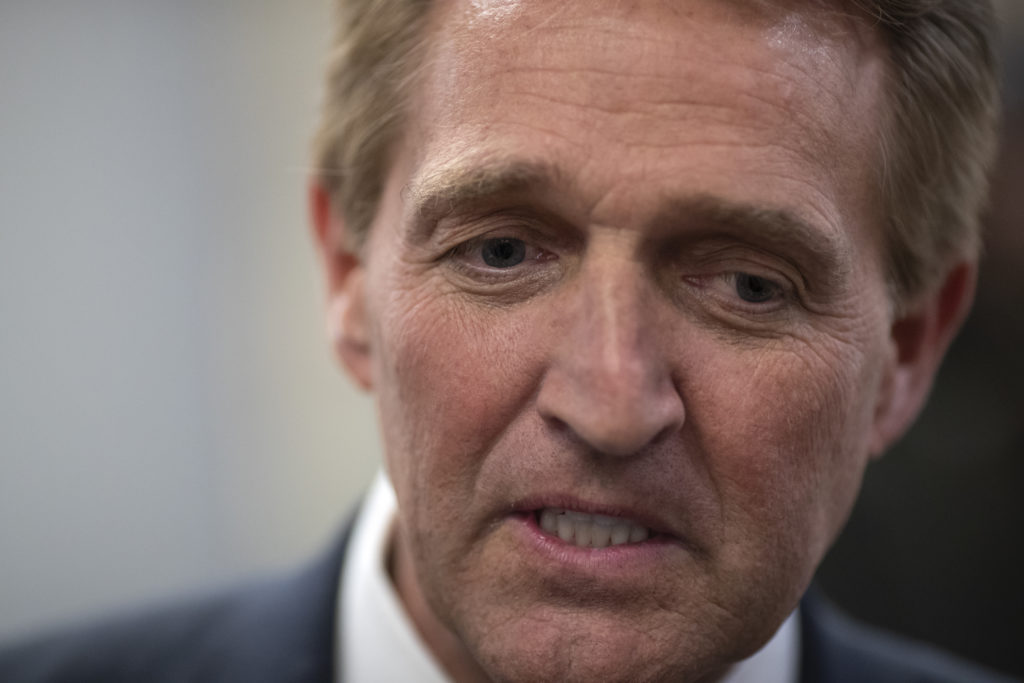
Republican Sen. Jeff Flake said Wednesday that he won’t vote to confirm judicial nominees unless GOP leaders hold a vote on legislation to protect special counsel Robert Mueller from being fired. Flake of Arizona and Democratic Sen. Chris Coons of Delaware went to the Senate floor on Wednesday and tried to bring the legislation up for a vote. But Senate Majority Leader Mitch McConnell objected. McConnell has said that the legislation is unnecessary because he believes Mueller won’t be fired. Flake and Coons called for the vote in the wake of Attorney General Jeff Sessions‘ departure. President Donald Trump pushed Sessions out last week and temporarily replaced him with a loyalist, Matt Whitaker, who has criticized the Mueller investigation. The special counsel’s probe is investigating Russian interference in the 2016 presidential election and Russian ties to Trump’s Republican campaign. “This is not a moment for our leadership to be weak or irresolute or compromised in any way,” Flake said, adding that “the president now has this investigation in his sights and we all know it.” He said the appointment of Whitaker was a “blatant” move that increased the urgency for the legislation. Flake, who retires in January, said he wouldn’t vote to confirm judges on the Senate floor or to advance them out of committee until there was a vote on the Mueller bill. He said he’d continue to come to the Senate floor to call for one. McConnell objected without comment. But he said earlier Wednesday that he’s never heard anyone at the White House suggest they want to shut the investigation down. “I think it’s in no danger, so I don’t think any legislation is necessary,” McConnell said. The move by Flake and Coons comes more than a year after the bipartisan legislation was introduced and underscores the deep concerns many lawmakers have long had over Trump’s comments about Mueller’s investigation. Trump has repeatedly called the probe a “hoax” and leveled personal criticism at the former FBI director. Those concerns were only amplified after Trump appointed Whitaker as acting attorney general. Whitaker is now overseeing the probe, which had previously been overseen by Deputy Attorney General Rod Rosenstein. Rosenstein told Congress that he saw no reason to fire Mueller. Sessions had recused himself from overseeing Mueller because he worked on Trump’s campaign — a decision that infuriated Trump and led to Sessions’ resignation. Several other Republicans have said they would vote for the special counsel bill. They include Senate Judiciary Committee Chairman Chuck Grassley, Maine Sen. Susan Collins and the legislation’s GOP co-sponsors, South Carolina Sen. Lindsey Graham and North Carolina Sen. Thom Tillis. Democrats, who will take the House majority in January, have also said shielding Mueller’s investigation will be one of their top priorities. Along with Senate Democratic leader Chuck Schumer, they have called for the special counsel bill to be added to a year-end spending bill that must pass in December to avoid a partial government shutdown. The bipartisan legislation to protect Mueller was approved by the Senate Judiciary Committee in April. It would give any special counsel a 10-day window to seek expedited judicial review of a firing and put into law existing Justice Department regulations that a special counsel can only be fired for good cause. Despite some GOP support, it’s unclear if the measure could gain 60 votes in the Senate — and even less clear that Trump would sign a bill that contained the legislation. Flake and Coons said they were certain they could get 60 votes and noted that Trump has changed his mind on legislation before. On Tuesday, Grassley said that he would leave the decision up to McConnell but that “if it comes to a vote, I will vote for that bill.” Graham, who is close to Trump, said he doesn’t expect Mueller to be fired, “but it would probably be good to have this legislation in place just for the future.” Tillis said he was talking to other senators about how they might be able to get it done. Collins said passage of the bill would “send a powerful message that Mr. Mueller must be able to complete his work unimpeded.” Mueller’s investigation has already resulted in six guilty pleas, a trial conviction and pending charges against more than two dozen others, including Russian intelligence officers. According to a new court filing Wednesday, the investigation could go on for several more months. Prosecutors say they’re not ready for Trump campaign aide Rick Gates to be sentenced because he is continuing to cooperate with “several ongoing investigations.” And they’re asking a federal judge to give them until mid-January to offer another update about his case. Gates pleaded guilty this year to two felonies as part of the probe. Gates’ mentor, ex-Trump campaign chairman Paul Manafort, was convicted this year on eight counts of tax and bank fraud. He is also cooperating. Republished with permission from the Associated Press.
Donald Trump agrees to FBI probe of Kavanaugh, bows to Jeff Flake, Dems
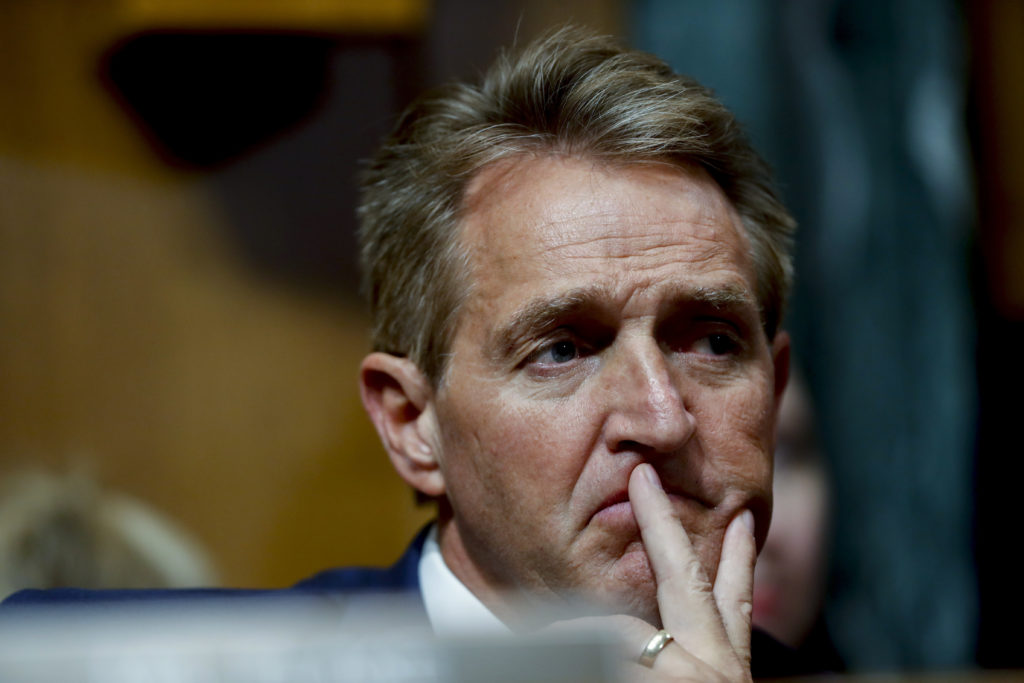
Reversing course, President Donald Trump bowed to Democrats’ demands Friday for a deeper FBI investigation of Supreme Court nominee Brett Kavanaugh after Republican Sen. Jeff Flake balked at voting for confirmation without it — a sudden turn that left Senate approval newly uncertain amid allegations of sexual assault. Kavanaugh’s nomination had appeared back on track earlier Friday when he cleared a key hurdle at the Senate Judiciary Committee. But that advance came with an asterisk. Flake indicated he would take the next steps — leading to full Senate approval — only after the further background probe, and there were suggestions that other moderate Republicans might join his revolt. The abrupt developments gave senators, the White House and millions of Americans following the drama at home hardly a chance to catch their breath after Thursday’s emotional Senate hearing featuring Kavanaugh angrily defending himself and accuser Christine Blasey Ford determinedly insisting he assaulted her when they were teens. Emotions were still running high Friday, and protesters confronted senators in the halls. “The country is being ripped apart here,” said Flake. After he took his stance, Republican leaders had little choice but to slow their rush to confirm Kavanaugh, whom they had hoped to have in place shortly after the new court term begins Monday. Trump quietly followed suit, though he had vigorously resisted asking the FBI to probe the allegations of sexual misconduct by Kavanaugh, now being raised by three women. One day earlier, he had blistered the Senate process as “a total sham,” accused Democrats of a conspiracy of obstruction and declared on Twitter, “The Senate must vote!” The new timeline puts Trump’s nominee in further peril and pushes the politically risky vote for senators closer to the November congressional elections. It also means that any cases the Supreme Court hears before a ninth justice is in place will be decided by just eight, raising the possibility of tie votes. It was clear Republicans were still short of votes for final Senate approval after Thursday’s hearing. They convened late into the evening in a room in the Capitol with various senators, including Susan Collins of Maine and Lisa Murkowski of Alaska, raising pointed questions, according to those familiar with the private meeting but granted anonymity to discuss it. Republican leaders said — and Trump ordered — that the new probe be “limited in scope.” But there was no specific direction as to what that might include. Two other women besides Ford have also lodged public sexual misconduct allegations against Kavanaugh. Democrats have been particularly focused on getting more information from Mark Judge, a high school friend of Kavanaugh who Ford said was also in the room during her alleged assault. Judge has said he does not recall any such incident. In a new letter to the Senate panel, he said he would cooperate with any law enforcement agency assigned to investigate “confidentially.” Kavanaugh issued his own statement through the White House saying he’s been interviewed by the FBI before, done “background” calls with the Senate and answered questions under oath “about every topic” senators have asked. “I’ve done everything they have requested and will continue to cooperate,” said the 53-year-old judge. Flake, a key moderate Republican, was at the center of Friday’s uncertainty. In the morning, he announced he would support Kavanaugh’s nomination. Shortly after, he was confronted in an elevator by two women who, through tears, said they were sexual assault victims and implored him to change his mind. “Look at me and tell me that it doesn’t matter what happened to me,” said 23-year-old Maria Gallagher, a volunteer with a liberal advocacy group. The confrontation was captured by television cameras. Soon he was working on a new deal with his Republican colleagues and Democrats in a Judiciary Committee anteroom. Flake announced he would vote to advance Kavanaugh’s nomination to the full Senate only if the FBI were to investigate. Democrats have been calling for such a probe, though Republicans and the White House have insisted it was unnecessary. The committee vote was 11-10 along party lines. Attention quickly turned to a handful of undeclared senators. Two other key Republicans, Collins and Murkowski, said they backed the plan after they and other GOP senators met for an hour in Senate Majority Leader Mitch McConnell‘s office in the Capitol. West Virginia Democrat Joe Manchin said he supported Flake’s call for a further probe “so that our country can have confidence in the outcome of this vote.” With a 51-49 majority, Senate Republicans have little margin for error on a final vote, especially given the fact that several Democrats facing tough re-election prospects this fall announced their opposition to Kavanaugh on Friday. Bill Nelson of Florida, Joe Donnelly of Indiana and Jon Tester of Montana all said they would vote no. Flake’s vote on final approval is not assured either. Some Republicans still resisted the delay but went along with the plan that may be the only way salvage Kavanaugh’s confirmation. “I think it’s overkill,” said Sen. Orrin Hatch, R-Utah. “But they have a right to request it.” The FBI conducts background checks for federal nominees, but the agency does not make judgments on the credibility or significance of allegations. It compiles information about the nominee’s past and provides its findings to the White House, which passes them along to the committee. Republicans say reopening the FBI investigation is unnecessary because committee members have had the opportunity to question both Kavanaugh and Ford and other potential witnesses have submitted sworn statements. Agents could interview accusers and witnesses and gather additional evidence or details that could help corroborate or disprove the allegations. Republished with permission from the Associated Press.
Brett Kavanaugh gains key GOP senator ahead of crucial vote
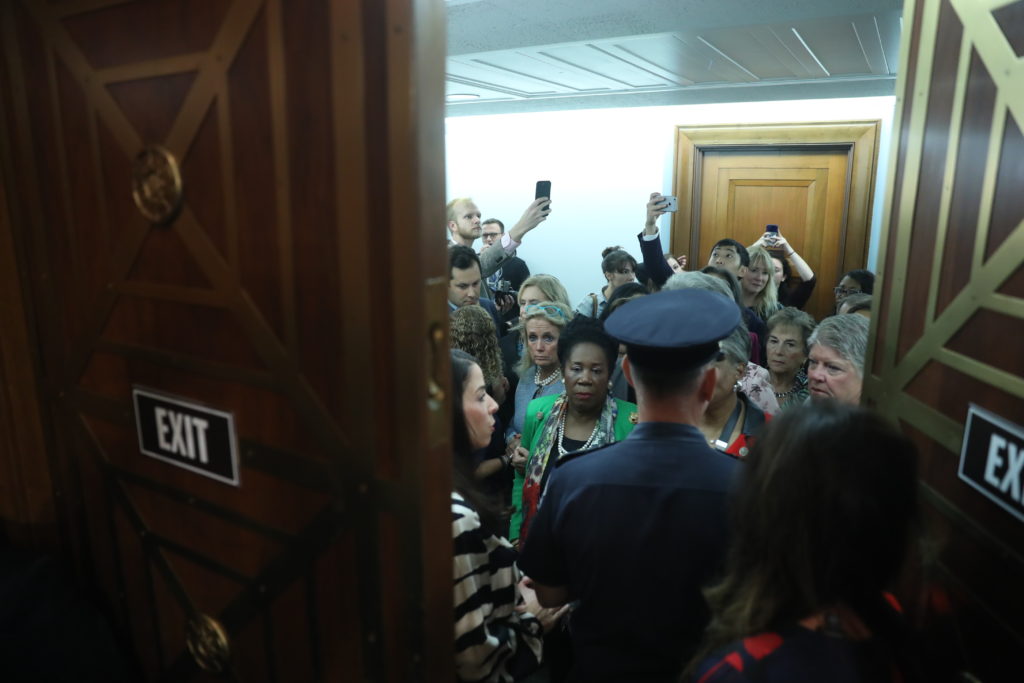
Supreme Court nominee Brett Kavanaugh gained the support of a key Republican senator Friday, virtually ensuring his nomination will advance to the full Senate a day after he adamantly denied sexually assaulting Christine Blasey Ford, who insisted she’s “100 percent” certain he did. Moments before the panel convened, Arizona Sen. Jeff Flake, a member of the committee, announced he would vote to confirm Kavanaugh, who he said was entitled to the “presumption of innocence … absent corroborating evidence.” “While some may argue that a different standard should apply regarding the Senate’s advice and consent responsibilities, I believe that the Constitution’s provisions of fairness and due process apply here as well,” Flake said. “I will vote to confirm Judge Kavanaugh.” The committee scheduled an afternoon vote on whether to recommend Kavanaugh’s nomination to the full Senate. After the vote was scheduled, several Democratic members of the panel walked out. Meanwhile, there were signs the remarkable testimony before the panel — in which Kavanaugh angrily declared his innocence and Ford calmly recounted the moment in which she says he attacked her — had registered negatively with two organizations whose support Kavanaugh had earlier received. The American Bar Association, which previously gave Kavanaugh its highest rating of “well qualified,” asked senators to delay all votes on him until the FBI can do a full background check on the assault claims — something President Donald Trump has refused to order. White House spokeswoman Sarah Huckabee Sanders said to reporters Friday that Kavanaugh has already “been through six separate background investigations by the FBI.” Late Thursday, the magazine of the Jesuit religious order in the United States withdrew its endorsement of Kavanaugh, saying the nomination was no longer in the interests of the country and “should be withdrawn.” “If Senate Republicans proceed with his nomination, they will be prioritizing policy aims over a woman’s report of an assault,” the America magazine editors wrote. “Were he to be confirmed without this allegation being firmly disproved, it would hang over his future decisions on the Supreme Court for decades and further divide the country.” Kavanaugh has repeatedly cited his Roman Catholic faith and his years as a student at the Jesuit-run Georgetown Prep school in Maryland. Meanwhile, former President George W. Bush has been advocating for Kavanaugh with wavering senators in recent days, according to a person familiar with Bush’s outreach who wasn’t authorized to speak publicly. The White House said it was also engaging with wavering GOP senators but provided few details. Trump is publicly standing by his nominee. “His testimony was powerful, honest and riveting,” he tweeted late Thursday. “The Senate must vote!” Thursday’s testimony appeared to have only sharpened the partisan divide over Trump’s nominee. Republicans praised Ford’s bravery in coming forward, but many of them said her account won’t affect their support for Kavanaugh. At the daylong session Thursday, Ford and Kavanaugh both said the event and the public controversy that has erupted 36 years later had altered their lives forever and for the worse — perhaps the only thing they agreed on during a long day of testimony that was a study in contrasts of tone as well as substance. Telling her story in person for the first time, Ford, a California psychology professor, quietly told the nation and the Senate Judiciary Committee her long-held secret of the alleged assault in locked room at a gathering of friends when she was just 15. The memory — and Kavanaugh’s laughter during the act — was “locked” in her brain, she said: “100 percent.” Hours later, Kavanaugh angrily denied it, alternating a loud, defiant tone with near tears as he addressed the Senate Judiciary Committee. “You have replaced ‘advice and consent’ with ‘search and destroy,” he said, referring to the Constitution’s charge to senators’ duties in confirming high officials. Trump’s tweet later used the same “search and destroy” language. Repeatedly Democrats asked Kavanaugh to call for an FBI investigation into the claims. He did not. “I welcome whatever the committee wants to do,” he said. Committee Chairman Chuck Grassley, R-Iowa, has repeatedly declined as well. Republicans are reluctant for several reasons, including the likelihood that further investigations could push a vote past the November elections that may switch Senate control back to the Democrats and make consideration of any Trump nominee more difficult. Across more than 10 hours, the senators heard from only the two witnesses. Ford delivered her testimony with steady, deliberate certitude. She admitted gaps in her memory as she choked back tears and said she “believed he was going to rape me.” Kavanaugh entered the hearing room fuming and ready to fight, as he angrily denied the charges from Ford and other women accusing him of misconduct, barked back at senators and dismissed some questions with a flippant “whatever.” “You may defeat me in the final vote, but you’ll never get me to quit, never,” he said. Trump nominated the conservative jurist in what was supposed to be an election year capstone to the GOP agenda, locking in the court’s majority for years to come. Instead the nomination that Republicans were rushing for a vote now hangs precariously after one of the most emotionally charged hearings Capitol Hill has ever seen. Coming amid a national reckoning over sexual misconduct at the top of powerful institutions, it exposed continued divisions over justice, fairness and who should be believed. And coming weeks before elections, it ensured that debate would play into the fight for control of Congress. Wearing a blue suit as Anita Hill did more two decades ago when she testified about sexual misconduct by Clarence Thomas, Ford described what she says was a harrowing assault in the summer of 1982: How an inebriated Kavanaugh and another teen, Mark Judge, locked her in a room at a house party as Kavanaugh was grinding and groping her. She said he put his hand over her mouth to muffle her screams. “I believed he was going to rape me,” she testified, referring to
GOP Sen. Flake: Donald Trump is ‘slandering’ his attorney general
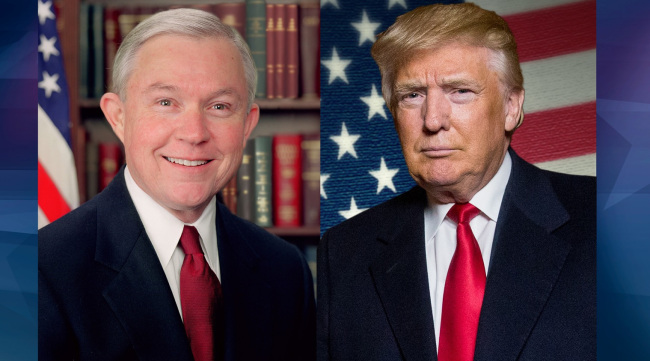
Republican Sen. Jeff Flake of Arizona is condemning President Donald Trump’s attacks on Attorney General Jeff Sessions, calling them a “travesty.” Flake, a vocal Trump critic, said Wednesday from the Senate floor that Trump has been “relentlessly slandering” Sessions. He warned that Trump seems headed for “some future assault” on the justice system, perhaps by firing Sessions or special counsel Robert Mueller. He urged Senate Majority Leader Mitch McConnell to hold a vote on legislation to protect Mueller’s investigation. Trump in a recent tweet suggested that Sessions should not have brought criminal charges against two Republican congressmen. He said “two easy wins” in the election were “now in doubt.” Flake says Congress has “the responsibility to curb such reckless behavior” from Trump and appealed to lawmakers to speak out. Republished with permission from the Associated Press.
Brett Kavanaugh faces final round of questioning without missteps
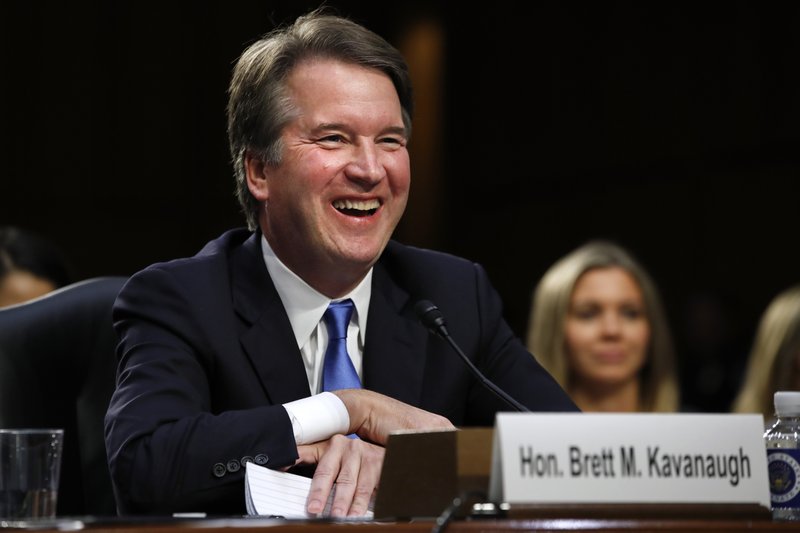
Senators will launch a final round of questioning of Brett Kavanaugh on Thursday, but after a marathon 12-hour session, President Donald Trump’s nominee to the Supreme Court appears to have avoided any major missteps that could trip his confirmation. So far, Kavanaugh does not seem to have changed minds on the Judiciary Committee, which is split along partisan lines. The judge left unanswered questions over how he would handle investigations of the executive branch and whether he would recuse himself if cases involving Trump under special counsel Robert Mueller’s probe end up at the court. His credibility may face new tests by senators who are seeking to make public some emails and documents from his Bush White House years that are being withheld by the committee as confidential. Trump says he’s pleased with his nominee’s televised performance, and Republicans are united behind him, eager to add a conservative judge to the court. The questioning of Kavanaugh has carried strong political overtones ahead of the November congressional elections. Democrats lack the votes to block confirmation, but have been pressing Kavanaugh for his views on abortion rights, gun control and other issues. Protesters have added to the challenges for Kavanaugh, repeatedly interrupting proceedings. “You’re more than halfway done,” Sen. Thom Tillis, R-N.C., told Kavanaugh as he gaveled the hearing closed late Wednesday. Pressured by Democrats with Trump on their minds during Wednesday’s grueling session, the judge insisted that he fully embraced the importance of judicial independence. But he refused to provide direct answers to Democrats who wanted him to say whether there are limits on a president’s power to issue pardons, including to himself or in exchange for a bribe. He also would not say whether he believes the president can be subpoenaed to testify. Still, he began his long day in the witness chair by declaring that “no one is above the law.” When Sen. Jeff Flake, R-Ariz., asked what constraints exist on executive power, the judge cited existing laws but also norms. “Norms are important. Historical practice is relevant to judicial decision-making,” he said. Democrats are concerned that Kavanaugh will push the court to the right and that he will side with Trump in cases stemming from Mueller’s investigation of Russian interference in the 2016 election and possible ties to the Trump campaign. The 53-year-old appellate judge answered cautiously when asked about most of those matters, refusing an invitation from Democratic Sen. Richard Blumenthal of Connecticut to pledge to step aside from any Supreme Court cases dealing with Trump and Mueller’s investigation. Under questioning by Republicans, Kavanaugh stressed the importance of judicial independence, “not being swayed by political or public pressure.” On abortion, Kavanaugh said the landmark 1973 Roe v. Wade decision that ensures access to abortion has been affirmed “many times.” He defended his dissenting opinion last year in the case of a pregnant immigrant teen in federal custody. Kavanaugh would have denied her immediate access to an abortion, even after she received permission from a Texas judge. Sen. Orrin Hatch, R-Utah, praised Kavanaugh for hiring female lawyers as clerks as a judge on the District of Columbia Court of Appeals, and then posed questions about whether Kavanaugh was aware of sexual harassment allegations against retired circuit court Judge Alex Kozinski in California. Kavanaugh, who considered the judge a friend and mentor, said he had known nothing about the allegations until they were disclosed last year. “It was a gut punch for me,” he said, and he was “shocked, disappointed, angry.” Kavanaugh also told Sen. Mazie Hirono, D-Hawaii, he was unaware of the domestic violence allegations against Rob Porter, who was Trump’s staff secretary. Journalist Bob Woodward’s new book about Trump says Kavanaugh recommended Porter for the job. Kavanaugh had served as staff secretary to George W. Bush and his work in the White House has figured in the hearing. Democratic senators have fought for access to documents from his three years as staff secretary, saying those could shed light on his views about policies from that era, including the detention and interrogation of terror suspects. Republicans have declined to seek the papers, and instead have gathered documents from his work as White House counsel to Bush. When questioned about the honesty of his 2006 testimony during his nomination for the appellate court when he said he was not involved in some Bush-era policies, Kavanaugh said he was “100 percent accurate.” Late Wednesday, Sen. Cory Booker, D-N.J., drew a rare partnership with Sen. Mike Lee, R-Utah, to release of some of the Bush-era documents. Lee complained that Booker was relying on an unreleased email to question Kavanaugh’s openness to racial profiling by police, but then agreed to work for its release. Republicans hope to confirm Kavanaugh in time for the first day of the new Supreme Court term, Oct. 1. Republished with the permission of the Associated Press.
Former Arizona U.S. Sen. Jon Kyl to replace John McCain
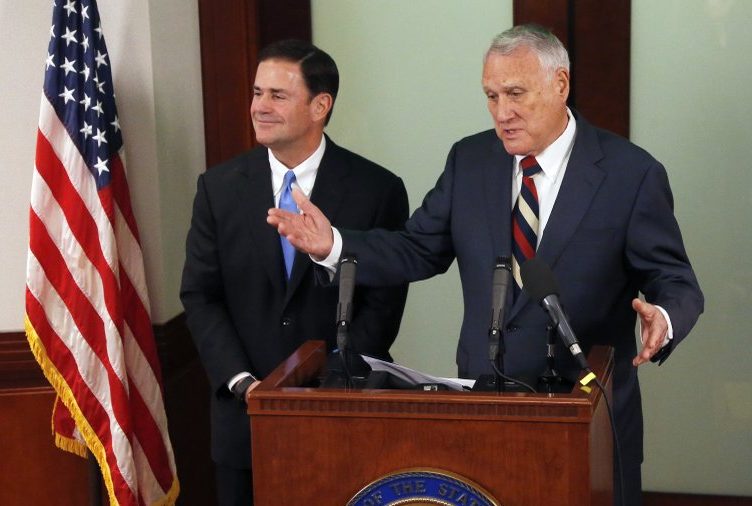
Prolonging the uncertainty over who will fill the late John McCain’s U.S. Senate seat, the governor of Arizona on Tuesday announced the appointment of former Sen. Jon Kyl but said he has only committed to serve until the end of the year. Kyl, a Republican who retired from the Senate in 2012 to spend more time with his family, is currently shepherding Trump’s nomination of Brett Kavanaugh to the U.S. Supreme Court. Kyl’s appointment will make it possible for him to vote for the nomination. But it’s unclear what more Kyl, 76, will do in Washington. He said he agreed to serve briefly out of a “sense of duty” and will not run for the seat in 2020, when Arizona voters will decide who fills the seat through 2022. The seat will then be up again for a full six-year term. Gov. Doug Ducey, also a Republican, said Kyl was “the best possible person, regardless of politics” for the job, and he hopes Kyl serves past the end of the year. If Kyl does leave the Senate after the end of the current congressional term next Jan. 3, Arizona’s governor can appoint another senator for the remaining year. By state law the senator will have to be a member of the same party as the departing one, in this case the GOP. For now, Kyl will pad Republicans’ margin in the narrowly divided Senate. They hold a 51-49 majority but that dwindled to a single vote while McCain stayed in Arizona for much of this year being treated for the brain cancer that killed him on Aug. 25. The GOP is hoping Kyl will be a more reliable partisan vote than McCain, whose opposition to a partial repeal of President Obama’s health care law pitched the party into turmoil last year. Kyl is well-respected in Arizona and has been able to avoid many of the battles with activists that complicated McCain’s career and that of the state’s other senator, Jeff Flake, who is retiring because his feud with Trump made his re-election impossible. Kyl’s entire career in Washington overlapped with McCain’s, and he served with the state’s senior senator for three terms before stepping down. Kyl carved out a profile as a reliable conservative vote and a foreign policy expert. McCain’s widow, Cindy, tweeted: “Jon Kyl is a dear friend of mine and John’s. It’s a great tribute to John that he is prepared to go back into public service to help the state of Arizona.” Doug Cole, a veteran Republican consultant and former McCain aide, said Kyl was a good, safe pick. “I think McCain would be very happy with the pick. Honors his legacy while putting some major horsepower for Arizona in the seat, at least for now,” he said. An attorney, Kyl speaks in a formal, reserved manner that is a sharp contrast to President Trump, and he belongs to an older, less populist vanguard of the GOP. At a news conference where he was introduced as McCain’s replacement, Kyl said in a response to a question that he’s only met Trump once, though he noted he is working for the White House by serving as Kavanaugh’s so-called “sherpa.” With a nod toward McCain, Kyl said the president’s “desire to jump into the middle of or be in the middle of a fight — and by the way that reminds me of somebody — can be detrimental in the end to what he’s trying to achieve.” The unusual timing of Kyl’s appointment could work out for another Arizona Republican who wants to become a U.S. senator — Rep. Martha McSally. She’s currently locked in a tough campaign against Democratic Rep. Kyrsten Sinema for the Senate seat Flake is vacating. Should she lose, McSally — a former Air Force colonel who once worked on Kyl’s staff — could be appointed to the McCain seat if Kyl vacates it in January. Filling McCain’s seat marks a turning point in Arizona political history. The seat has been held by two men who were heralded as giants of the Senate: McCain took the seat once held by Sen. Barry Goldwater after McCain had served in the House of Representatives. The choice of Kyl will also have political consequences for Ducey. He’s up for re-election this November against Democratic challenger David Garcia. For Republican voters who are on the fence about Ducey, a choice they dislike could cause them to withdraw their support for the incumbent or stay home on Election Day. Republished with the permission of the Associated Press.
Lawmakers struggling to develop a response to Donald Trump, Vladimir Putin

Congress is producing an unusual outpouring of bills, resolutions and new sanctions proposals to push back at President Donald Trump’s approach to Vladimir Putin, shore up relations with NATO allies and prevent Russian interference in the midterm election. But it remains uncertain if any of their efforts will yield results. Lawmakers are struggling with internal party divisions as well as their own onslaught of proposals as they try to move beyond a symbolic rebuke of Trump’s interactions with the Russian president and exert influence both at home and abroad. And while many Democrats are eager for quick votes, some Republicans prefer none at all. As Trump and Putin weigh another face-to-face meeting, lawmakers in both parties — particularly in the Senate — appear motivated to act. Senate Majority Leader Mitch McConnell issued a rare warning that Russia “better quit messing around” in U.S. elections as he tasked two Senate committees to start working on sanctions-related legislation and other measures to deter Russia. In the House, Speaker Paul Ryan joined McConnell in saying that Putin would not be welcome on Capitol Hill, though he did not push forward any Russia-related legislation before his chamber recessed for August. Still, the past few weeks have been one of the rare moments in the Trump era that Republicans and Democrats have jointly asserted the role of Congress as a counterweight to the administration. “You look at the action of Congress since the summit in Helsinki, you find Democrats and Republicans both standing up and saying no,” said Sen. Ben Cardin, D-Md., in an interview on C-SPAN with The Associated Press and The Washington Post. For starters, there’s a bipartisan push from Sen. John McCain, R-Ariz., Sen. Tim Kaine, D-Va., and others to “explicitly prohibit” the president from withdrawing from NATO without Senate approval. Other senators are debating action to prevent meddling in the midterm election. Sen. Lindsey Graham, R-S.C., and Sen. Amy Klobuchar, D-Minn., call the protection of the election system a “national security priority.” Graham said it’s “extremely important that Congress recognize the threat to our electoral system coming from Russia and act in a decisive way.” In addition, legislation from McCain and Cardin would require approval from Congress before Trump could reverse sanctions issued under the Sergei Magnitsky Act, which bans visas for travel and freezes assets of key Russians involved in alleged human rights abuses. Russia’s displeasure at the 2012 Magnitsky Act played into what Trump initially called an “incredible offer” from Putin at the summit to allow U.S. questioning of Russians indicted by the Justice Department for hacking Democratic emails. In return, Putin requested the ability to investigate Americans involved in the Magnitsky Act. McCain called it a “perverse proposal” and Trump has since backed away from it. With some 100 days before the midterm election, some say Congress is not acting fast enough. One bill that has been given a go-ahead nod from McConnell is legislation from Sen. Marco Rubio, R-Fla., and Sen. Chris Van Hollen, D-Md., that attempts to warn Putin off more election interference by setting up tough new sanctions on Russia if it does try to intervene. The measure is slowly making its way through the Senate Banking Committee, but some lawmakers in the House and Senate have raised concerns it casts too wide a net and could cause problems for allied nations that do business with Russia. Rubio says he’s willing to adjust the legislation to meet concerns, but says the goal is for Russia to understand there will be a price to pay for further election interference. He adds the legislation was introduced months before the Helsinki summit and isn’t intended to embarrass or attack the president. “I’m deeply concerned about their ability to interfere in our politics,” Rubio said in an interview. “We want them to know what the price is going to be to make that choice.” The legislation would likely see overwhelming support, lawmakers in both parties say. But a vote is not scheduled. Some symbolic measures on Russia have failed to make it out of the starting gate. Already, the Senate has blocked a symbolic resolution from Sen. Jeff Flake, R-Ariz., and Sen. Chris Coons, D-Del., to reaffirm the findings of the American intelligence community that Russia interfered in the 2016 election. Twice over the past two weeks, Republicans objected to motions to advance the measure, saying they prefer a more strategic approach that goes beyond symbolic resolutions. House Democrats were similarly thwarted in their attempts to slap new sanctions on anyone who has interfered in U.S. elections and bolster election security funds to the states as Republicans blocked those votes. Key Republicans are panning more federal spending on election security. The GOP chairman of the Senate Appropriations Committee, Alabama Sen. Richard Shelby, said Monday that he worried federal funds would come with “strings attached” that would interfere with elections operations he believes should be left to the states. Ryan says the U.S. has “learned a great deal” about Russian interference. “So, I think we’re far better prepared today than we were just a couple of years ago.” But the Speaker added there’s more for Congress to do. Republished with the permission of the Associated Press.
Donald Trump returns to Arizona – and a chaotic political landscape
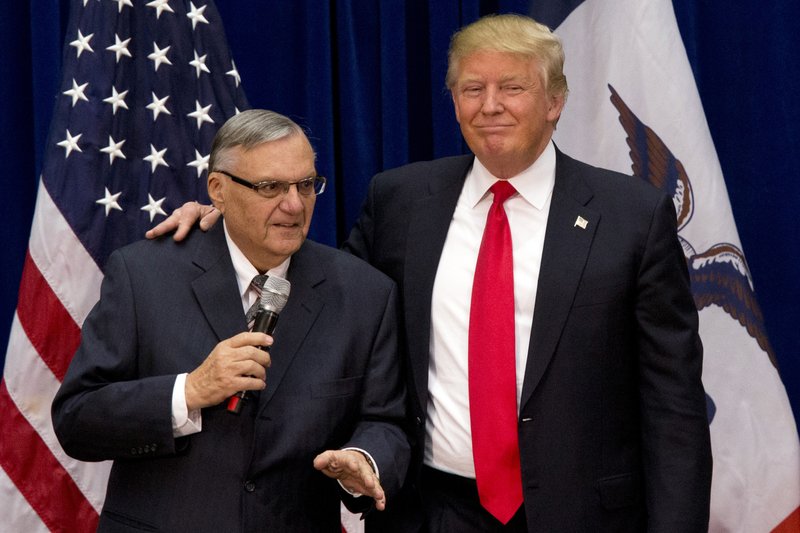
Donald Trump was just a few weeks into his candidacy in 2015 when he came to Phoenix for a speech that ended up being a bigger moment in his campaign than most people realized at the time. Trump savaged his critics and the media, vowed to fine Mexico $100,000 for each immigrant entering the country illegally, talked tough on trade, promised to return America to its winning ways and borrowed a line from Richard Nixon in declaring, “The silent majority is back.” The packed crowd ate it up — the raucous enthusiasm an early sign of the overwhelming support among Trump’s base that would help carry him to the presidency. As Trump returns to Arizona Tuesday in need of another big moment, he will find a place where his agenda and unconventional leadership style have consumed the political landscape and elevated the state’s status in the national fight for control of power in Washington in 2018. It was Arizona senator John McCain who cast the vote that derailed Trump’s effort to repeal the health care law. The other Arizona senator, Jeff Flake, has become the poster child for Republicans who buck the president’s agenda and feel his wrath on Twitter. The president is almost certain to back a GOP challenger to Flake in 2018, complicating Republican efforts to maintain control of the Senate. Trump has also revived the immigration debate and infuriated Latinos here with his talk of pardoning former Sheriff Joe Arpaio over his recent conviction for breaking the law with his signature immigration patrols. The controversy over Civil War monuments has even spilled into Arizona, where the governor has faced repeated calls to take down a handful of Confederate memorials in the state. And an overlooked item in Trump’s agenda, school choice, has made education a hot campaign issue in Arizona. With the strong support of Education Secretary Besty DeVos, Arizona passed the nation’s most ambitious expansion of vouchers this year, and public-school advocates recently submitted more than 100,000 signatures in a petition drive to get the law wiped out on the 2018 ballot. If that isn’t enough fuel for a political bonfire, Trump’s visit to Arizona will be his first political event since the race-driven violence in Virginia and his divisive comments in the aftermath of the protests. That created a dilemma for Republicans like Gov. Doug Ducey on whether to take the stage at the Trump rally while running for re-election. Doing so would subject him to attacks from moderates and the left by appearing with the president so soon after Charlottesville and possibly at the same time as the president pardons Arpaio and throws his endorsement behind Flake’s challenger. But avoiding the stage could hurt him with the base. Ducey’s plan is to greet the president on the airport tarmac and skip the rally, saying he wants to oversee the law enforcement response to protests. The governor supported Trump and appeared on stage at one of his rallies last year in Arizona. Trump would be hard-pressed to find a state where his Republican base is as faithful and vocal as in Arizona, which is a big reason why he came to the state seven times during his campaign and refers to the “special place” it holds for him. The fierce, non-conformist political spirit evident at Trump rallies here traces its roots to the frontier days and allows hard-fisted politicians like him and Arpaio to thrive. “The Republican primary base in Arizona is highly partisan, semi-libertarian in the sense that it’s against the swamp,” said longtime Republican political strategist Chuck Coughlin. “We’re the 48th state to join. We’re still acting like a juvenile. We still act like we’re the last one invited to the party which is sort of what Donald Trump is.” The biggest consequence of Trump’s unorthodox governing style may be seen in Flake’s re-election effort. Flake has been outspoken in his criticism of Trump, taking him to task in pointed jabs in a recent book. Trump has been sending out Tweets signaling his support for far-right former state Sen. Kelli Ward, who is running against Flake in the primary. Other Republicans with less baggage than Ward could also enter the race and complicate things further, making it harder for Republicans to keep the seat in the general election. Rep. Kyrsten Sinema is considered the top threat on the Democratic side. “If the president himself is supporting a challenger to Jeff, it’s a serious problem,” said Coughlin, who has been polling voters about the intraparty turmoil that has unsettled the race. Voters like Julie Brown are indicative of the GOP struggle in the Trump administration between the base and establishment. She attended a Trump rally last year and remains steadfast in her support of the president, even after Charlottesville. “He’s not totally polished and everyone tears apart his words, but you’ll never have to guess what he’s thinking and I like that much better than a politician who just gets up there and buoyantly lies and is bought by lobbyists,” Brown said. “He’s just straightforward, and like I said, it rocks the boat but we need it.” Republished with permission of The Associated Press.
Donald Trump’s fundraising prowess keeps Republican Party close

Republican senators are bucking President Donald Trump’s calls to revive the health care debate. And Trump just ousted his only top White House aide with deep links to the Republican Party. But the president and his party won’t be calling it quits anytime soon. They remain tightly linked by a force more powerful than politics or personal ties: cash. Trump’s fundraising prowess is the engine of the Republican National Committee and a lifeline for every Republican planning to rely on the party for financial help during next year’s congressional races. Leaning heavily on Trump’s appeal among small donors, the party has raised $75 million in the first six months of the year, more than double what the Democratic National Committee had raised by the same point in President Barack Obama’s first year. “The president is somebody who absolutely is an asset when it comes to fundraising,” RNC chairwoman Ronna Romney McDaniel said. Trump resonates with a base of Republicans who have been more willing this year than ever before to chip in. The party says it collected more cash online in the first six months of the year than in all of 2016. In late June, Trump played star and host of a fundraiser for his re-election campaign and the RNC. The event at the Trump International Hotel, just down Pennsylvania Avenue from the White House, raised $10 million to be divided between Trump and the party, the kind of bounty usually reserved for the final months before an election. The fundraising numbers help explain why more Republicans — particularly those facing re-election next year — aren’t openly distancing themselves from a president whose approval rating hovers below 40 percent and whose White House has been wracked by public back-biting and legislative stumbles. And while Trump hasn’t hesitated to call out Republicans who defy him, he’s largely come to appreciate the permanence the RNC offers a White House that has had to quickly staff up from nothing — a task that hasn’t always gone smoothly. Trump’s dismissal last week of chief of staff Reince Priebus prompted a rush of concern from Republican lawmakers who’d gotten to know Priebus during his nearly six years as party chairman. Some wondered if Trump was losing his only link to the Republican Party. Yet the well-funded RNC has been reformatted for the Trump era. “The president likes the fact that the party is structured to help his agenda, and there’s not a question that this RNC is 100 percent loyal to him,” said Brian Ballard, one of the party’s lead fundraisers. “It’s not like the RNC he inherited as the party’s nominee; it’s his now.” Party employees have led communication at key points of the investigations into whether the Trump campaign had anything to do with Russian interference in the presidential election. And the RNC, realizing how important television is to this particular White House, has added employees to help book Trump proponents on cable shows. There are awkward GOP moments, to be sure. Just this week, Arizona Republican Sen. Jeff Flake, in his new book, called out Trump for his “seeming affection for strongmen and authoritarians.” Trump over the weekend on Twitter ridiculed Senate Republicans for not passing a health care bill, saying Democrats were laughing at them and they “look like fools.” McDaniel said the president has “every right” to engage with Republicans however he sees fit. “The American people put him in office to accomplish his agenda,” she said. She’s backed him up on Twitter: “I run into people every day who are hurting across the country under Obamacare,” she wrote recently. “Giving up is not an option.” Priebus and others at the RNC were squeamish about their presidential nominee at various points during the 2016 campaign, but few if any detractors remain at its headquarters on Capitol Hill, where the hallways are lined with portraits of Trump and blown-up snapshots of him. The RNC voted McDaniel in as party chair on Trump’s recommendation. As the Michigan GOP head, she’d been a staunch Trump supporter even as her uncle, 2012 Republican presidential nominee Mitt Romney, expressed his own reservations about Trump during the campaign. Trump also tapped Bob Paduchik, his campaign’s Ohio director, to serve as a deputy to McDaniel. The two remain close, and Paduchik traveled with Trump last month for a rally in Youngstown. Trump’s family, including son Donald Trump Jr. and daughter-in-law Lara Trump, Eric Trump’s wife, are involved in the RNC’s strategy and fundraising and have grown close to McDaniel. Longtime Trump friend Steve Wynn, a fellow billionaire businessman, is the party’s chief fundraiser; the president’s personal lawyer, Michael Cohen, is among the RNC’s principal fundraisers. His campaign’s trusted data and digital director, Brad Parscale, joined the board of Data Trust, the party’s data vendor, which keeps its voter files up to date. Trump heaped praise on the RNC’s leadership team during the June fundraiser, calling them stars and winners. Bill Stepien, the White House’s political director, said relations between the party and the president are as good now as they were in the mid-2000s, when he worked at the RNC while George W. Bush was president. Stepien said the White House and the party have “a strong relationship” and that Trump’s aides view the RNC as an “essential component” of his success. Republished with permission of The Associated Press.
Analysis: Donald Trump unlikely to avoid blame for health care loss
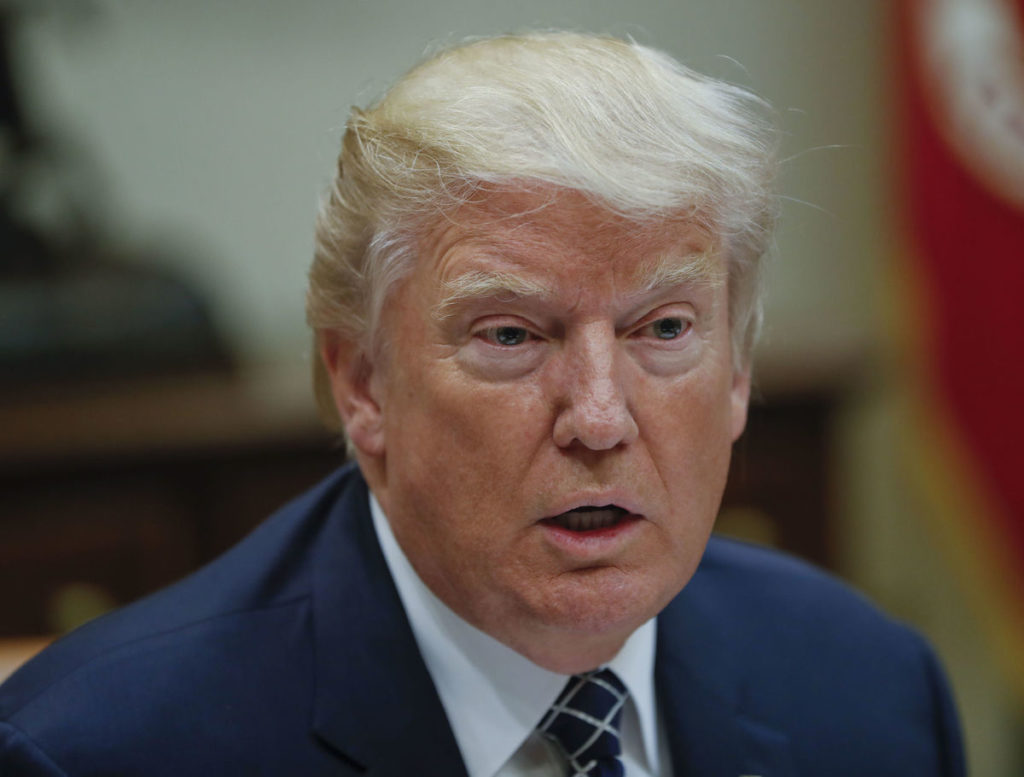
It was a far cry from “The buck stops here.” President Donald Trump, dealt a stinging defeat with the failure of the Republican health care bill in the Senate, flipped the script from Harry Truman’s famous declaration of presidential responsibility and declared Tuesday, “I am not going to own it.” He had tweeted earlier, “We were let down by all of the Democrats and a few Republicans.” This is the same president who thundered night after night on the campaign trail that it would be “so easy” to repeal and replace the Obama health care law on Day One of his administration. Try and tweet as he might, Trump can’t now avoid a share of the blame for the stall-out of that repeal effort. It’s a president’s burden to shoulder the nation’s problems whether they are inherited or created in real time. Barack Obama took office with the American economy facing its worst crisis since the Great Depression. John F. Kennedy accepted responsibility for the failure of the invasion of Cuba at the Bay of Pigs, ordered on his own watch. “That’s the nature of being elected president: You own the policies, the economy and the government,” said presidential historian Julian Zelizer, a professor at Princeton University. “You own the positives and negatives of the job whether you think it’s your fault or not. You live in the White House: You can’t disassociate yourself from what happens if you don’t like it.” Trump took office armed with Republican control of both houses of Congress and an ambitious agenda that would begin with the repeal and replacement of Obamacare. Six months later, the collapse of the GOP plan was a sharp rebuke for the president, who was unable to cajole or threaten Republicans to stay in line and who exerted little of his diminished political capital to see through a promise that had been at the core of his party since Obamacare became law seven years ago. The president’s disjointed support for the health care plan did little to persuade Republicans to support it, and the fact that his approval ratings had dropped below 40 percent didn’t help either. Trump never held a news conference or delivered a major speech to sell the bill to the public. He never leveraged his popularity among rank-and-file Republican voters by barnstorming the districts of wavering GOP senators. And he never spearheaded a coherent communications strategy — beyond random tweets — to push for the plan. “The best way to motivate members is talk to their constituents and at no point did he try to talk to Americans about health care reform in any sort of serious way,” said Alex Conant, a Republican strategist who worked on Florida Sen. Marco Rubio’s 2016 presidential campaign. “His attention seems to drift with whatever is on cable news on any given moment as opposed to what is on the Senate floor any given week.” Sounding almost like a bystander during his brief Oval Office remarks Tuesday, Trump six times expressed “disappointment” that the Republican effort had failed. And he insisted the fault rested with Democrats and suggested Obamacare should be left to fail on its own. “I’m not going to own it,” Trump insisted. “I can tell you that Republicans are not going to own it.” Democrats blasted Trump’s blame game, with Senate Minority Leader Chuck Schumer saying his refusal to accept responsibility demonstrated “such a lack of leadership.” “That is such a small and petty response,” Schumer said. “Because the president, he’s in charge. And to hurt millions of people because he’s angry he didn’t get his way is not being a leader.” Despite Trump’s efforts to shift blame across the aisle, the White House made little effort to court Democrats. Instead of initially pursuing an infrastructure plan — which would have likely received support from unions and blue-collar workers, making it hard for Democrats to oppose — Trump opted to tackle the far more polarizing issue of health care first. He outsourced most of the work to House Speaker Paul Ryan and Senate Majority Leader Mitch McConnell. It became a strictly Republican effort which, due to the party’s slight advantages in the House and Senate, had little margin for error. And it was conservatives from Trump’s own wing of the Republican party who thwarted him. The conservative House Freedom Caucus defied him and ignored his Twitter threats. The two senators who withdrew their support Monday night, effectively killing the bill, didn’t even give the White House a heads-up before announcing their decisions. And even though Trump allies have threatened to aid primary challengers to a pair of on-the-fence senators — Jeff Flake of Arizona and Dean Heller of Nevada — the Republicans did not cave, potentially setting a worrisome precedent for the White House as it tries to move ahead with the rest of its stalled agenda. Former House Speaker Newt Gingrich, a Trump adviser, believes that both Congress and the White House share blame after seemingly forgetting that “opposition parties pass press releases that get vetoed, while governing parties pass bills in which every paragraph gets scrutinized.” “I hope the president learns that do something really, really big, you need to be disciplined and focused and sort out your communications program,” said Gingrich. “So far, they are clearly not capable of doing that.” Republished with permission of The Associated Press.
Donald Trump thrusts U.S. presidency into perilous area
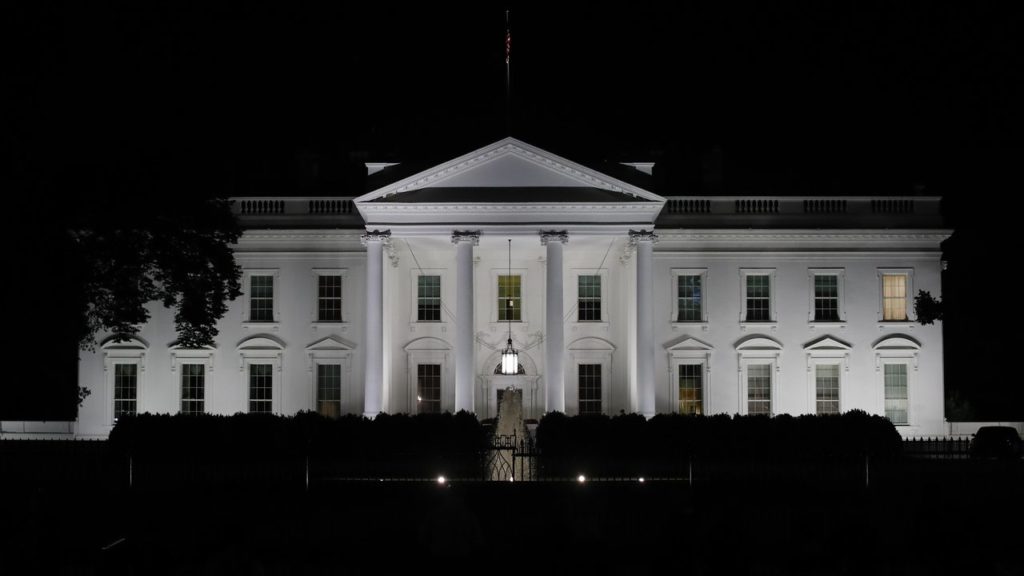
With his shocking dismissal of FBI Director James Comey, Donald Trump is propelling the presidency into rarely traversed territory. His surprise announcement Tuesday flouts decades of presidential deference to the nation’s top law enforcement agency and its independence. It earns Trump the dubious distinction of being the first president since Richard Nixon to fire the official overseeing an investigation involving the commander in chief. And it cements a clear pattern of a man willing to challenge — in dramatic fashion — the institutions created to hold the president accountable. “That’s why this is unprecedented,” said Michael Beschloss, a presidential historian. “He’s showed signs of not having a great deal of respect for the system by which this investigation has been operating.” Sen. Richard Burr, the North Carolina Republican who is overseeing one of the congressional investigations into Russia’s election interference, said: “I am troubled by the timing and reasoning of Comey’s termination.” Sen. Jeff Flake, R-Ariz., said he’d spent hours trying to find “an acceptable rationale” for Trump’s decision. “I just can’t do it,” he said. Trump attained his White House goal after a decades-long career in business during which he was accountable to few people other than himself. Thus, he has chafed at the constitutionally mandated constraints on the presidency. Within days of taking the oath of office, he suddenly fired acting Attorney General Sally Yates — a career Justice Department official — after she refused to defend the White House’s controversial travel and immigration ban. When the federal courts blocked that measure as well, Trump aggressively castigated individual judges as political actors and challenged the court’s role in curbing a president’s policies. No matter which president originally appoints them — Comey was tapped by Barack Obama in 2013 — almost all FBI directors are allowed to serve out their full 10-year terms under successor commanders in chief. Bill Clinton is the only other president to fire an FBI chief, amid questions about the director’s use of FBI aircraft for personal purposes. The Trump White House cited Comey’s handling of last year’s investigation into Hillary Clinton’s email practices as the cause for the firing, and, to be sure, Comey left himself vulnerable. He was widely criticized for heavy-handed and high-profile decisions in the case, particularly when he sent a letter to Congress 10 days before the election saying the bureau was looking at new information related to the inquiry. He said at the time that the new information related to emails found on a laptop belonging to the husband of Clinton aide Huma Abedin, the disgraced congressman Anthony Weiner. At the time, Trump praised Comey for having “guts” and doing “the right thing,” statements that complicate his assertion that now, seven months later, Comey’s decisions warranted firing. Trump’s announcement came as Comey was again facing criticism, this time for telling congressional lawmakers that Abedin had forwarded “hundreds or thousands” of emails to the laptop. On Tuesday, hours before Trump fired Comey, the FBI told lawmakers that the director was wrong, and Abedin had forwarded only a “small number” of emails. Although Democrats blame Comey for Clinton’s loss, they are unlikely to accept Trump’s explanation for the firing. The president has repeatedly dismissed Comey’s Russia investigation — as well as the congressional inquiries — as a “hoax.” He’s also insisted that he is not personally under investigation — asserting Tuesday that Comey told him three times that he was not a target — though the FBI has stated unequivocally that the president’s campaign and his associates are facing scrutiny. “This is Nixonian,” said Sen. Bob Casey, D-Pa. Jimmy Gurule, a former assistant attorney general who was appointed by President George H.W. Bush, said Trump’s decision “threatens our democracy and undermines the integrity of the FBI investigation.” Gurule is now a law professor at the University of Notre Dame. Nixon’s decision had a ripple effect throughout his administration, with the attorney general and deputy attorney general resigning rather than carry out the president’s orders. There was no such response from Trump’s White House aides and other top administration officials. “We haven’t had a voice from within the Trump administration denounce this yet,” said Douglas Brinkley, a presidential historian at Rice University. “I think at this moment the question is, will leading Republicans step out of the box and become profiles of courage?” In the immediate aftermath of Trump’s announcement, many Republicans appeared more inclined to back his decision, citing their own concerns with Comey’s stewardship of the FBI following months of controversy. None of the Republicans who did raise concerns were rushing to draw comparisons to Nixon, the only president to resign from office. Yet they, too, appeared troubled by Trump’s decision and wary of the prospect of White House interference in an investigation involving the president. Comey’s “removal at this particular time will raise questions,” said Sen. Bob Corker, R-Tenn. It is essential, he said, that ongoing investigations are full “and free of political interference until their completion.” Republished with permission of The Associated Press.
Martin Dyckman: Cowards who stand aside
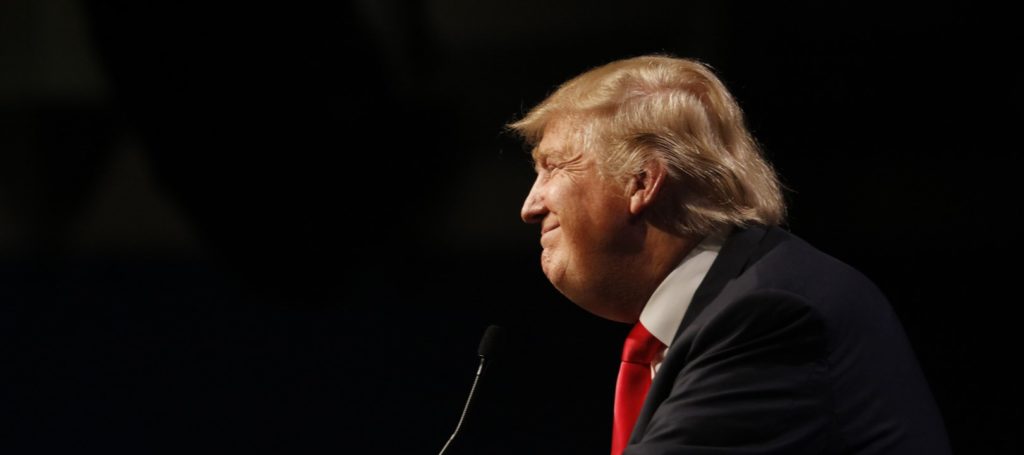
“Once to every man and nation “Comes the moment to decide “In the strife of truth with falsehood “For the Good or Evil side ….. “Then it is the brave man chooses, “While the coward stands aside” The American poet James Russell Lowell wrote those words in 1844 during the intensifying crisis over slavery. They speak to us again. Donald Trump is a uniquely evil candidate for president. It is indeed a moment to decide. Evil? I don’t wield that adjective casually. Trump’s gross sense of sexual entitlement, as he boasted in the Billy Bush tape, isn’t even the worst of it. We already knew about that aspect of his sleaziness, a misogyny bordering on perversion. But just as it appeared it couldn’t get any lower than that, it did. The cornered hyena struck back by threatening to prosecute and imprison his opponent if he wins. And that didn’t end with the debate. He’s been feeding it like raw meat to his howling mobs, reveling in their chants of “Lock her up.” There has never been anything like that in American politics. It’s what foreign tyrants like his darling Vladimir Putin do — that is, when they’re not simply killing their rivals. It’s what Fidel Castro, Adolf Hitler, Josef Stalin and Augusto Pinochet did to theirs. The list is long: Zimbabwe, Iran, North Korea, Turkey and others. “Republicans should not be okay with @realDonaldTrump threatening to jail his opponent after the election,” wrote Arizona Republican Sen. Jeff Flake. “That is not who we are.” Flake was an early and honorable critic of his party’s putrid nominee. He didn’t wait for the sewer to overflow. But far too many other Republicans still pretend for public consumption that Trump is fit to be president. They are the cowards who stand aside. That Trump is morally and mentally unfit and unworthy in every respect for the presidency is only part of the problem. The other is that he has laid bare and energized the ugly underside of American society. We host a virulent racism rooted in the original national sin of slavery. There is angry intolerance for the diversity reflected in our founding motto, e pluribus Unum — from many, one. There is hostility especially to the give-and-take political process upon which our democracy depends. Not all Trump supporters harbor these hatreds, but those who do will not fade away with his defeat. He seems, in fact, to be setting himself as up as a third force in American politics, subsuming the Tea Party in an authoritarian movement that most of us hoped could never happen here. The Republican Party bears enormous blame for this. Although conscientious Republicans were instrumental in passing the Civil Rights and Voting Rights acts of the 1960s, it was a series of their presidential candidates — Goldwater, Nixon, Reagan — who exploited Southern resentment to infect their party with racism and move it far to the right. There has been an endless parade of Republican politicians making their way into government by denouncing the very same political system at whose trough they feed. This is the paranoia upon which Trumpism feeds. Who in the GOP spoke out to denounce Trump in the four years he spent subverting President Obama‘s administration with the birther myth? I can remember only Colin Powell defending the president’s legitimacy. Other Republicans were happy to see someone with Trump’s celebrity doing their dirty work for them. Now they are shocked — shocked! — that someone so vile is their nominee. Give credit to those who refused, early and honorably, to wallow in the sewer. They include the former presidents Bush, Jeb Bush and his friend and adviser Mac Stipanovich, Sen. Lindsey Graham, and others who couldn’t stomach Trump’s demonization of Hispanics and Muslims, and also marked him — accurately—as not conservative. The good news, according to USA Today, is that more than a fourth of elected top Republicans — governors and members of Congress — are now refusing to endorse his candidacy. But the bad news is that nearly three of four of these so-called leaders still refuse to repudiate his candidacy despite his contempt for women and his threat to become a tyrant. Denouncing his gross behavior and his dirty mouth isn’t enough. He is unfit in every way for any office, let alone the highest in the land. No politicians who pretend otherwise are fit for office themselves. As has been written, Marco Rubio would rather debase himself — and his office — than risk alienating the Tea Partiers who put him into the Senate. It figures. He’s been nothing but an opportunist throughout his career, which has been defined by winning offices he hasn’t earned and puts to no good use. Rubio is hardly alone, of course, in putting his own welfare ahead of his country’s. Rubio and all other Trump apologists deserve to be defeated, every one of them. For our country’s sake, they must be. For the Republican Party’s own sake, they must be. The cowards should be pushed aside. ___ Martin Dyckman is a retired associate editor of the newspaper now known as the Tampa Bay Times. He lives in suburban Asheville, North Carolina.


